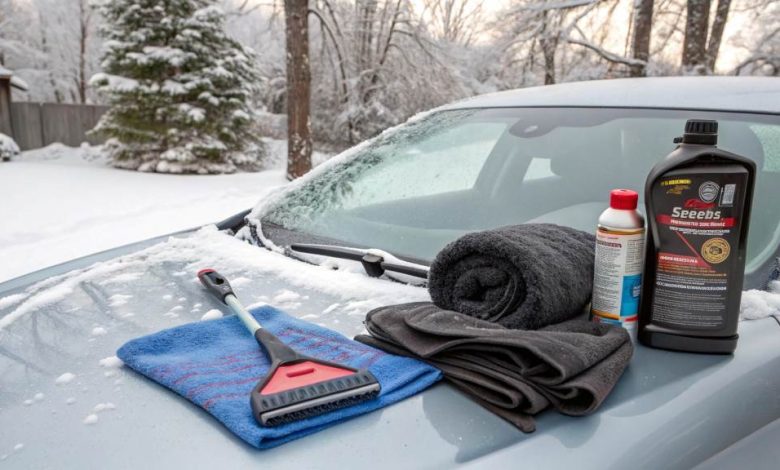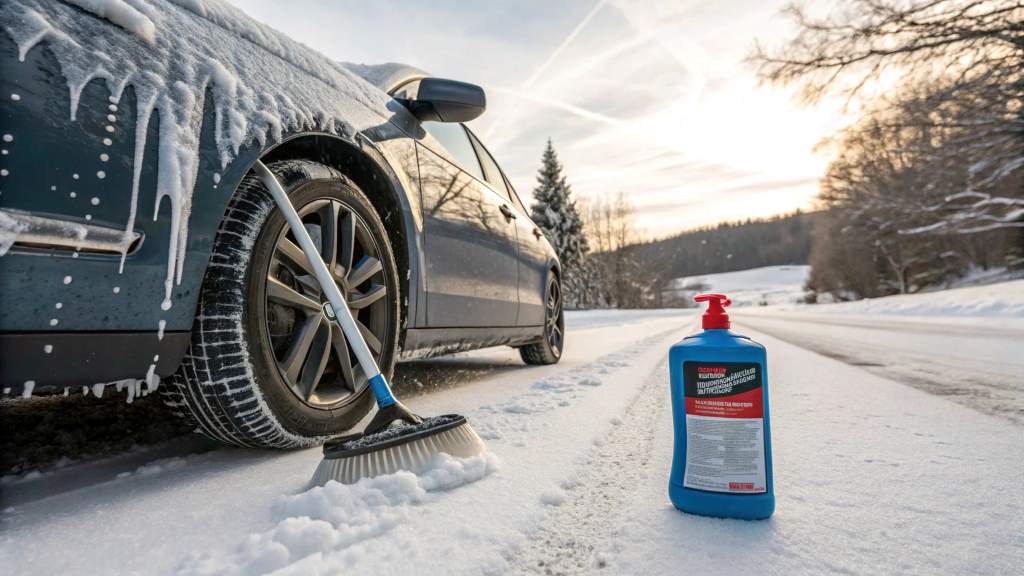Winter Car Care Hacks to Prevent Cold Weather Damage

Winter is a season that can wreak havoc on your car if you’re not prepared. Cold temperatures, ice, and snow can lead to a variety of issues, from frozen engines to dead batteries. However, with the right winter car care hacks, you can prevent cold weather damage and keep your vehicle running smoothly all season long. In this article, we’ll explore effective strategies to winterize your car and tackle potential issues before they arise. And if you’re looking for tips to keep your car in top shape, you can explore Trade Car Hub for expert advice and resources.
Protect Your Car Battery from the Cold
One of the most common winter car issues is a dead battery. Cold temperatures cause the battery’s chemical reaction to slow down, reducing its ability to hold a charge. The last thing you want is to be stranded with a dead battery on a freezing morning.
Winter Car Battery Care Tips:
- Inspect the Battery: Before the cold hits, check your car’s battery. Make sure the terminals are clean and free from corrosion. If you notice any buildup, clean it off with a mixture of baking soda and water. You can also use a battery terminal cleaner tool.
- Test Battery Voltage: If your battery is over three years old, get it tested at an auto shop. Many offer free battery tests. If it’s nearing the end of its life, replace it before winter sets in.
- Keep the Battery Warm: Some car owners opt to use a battery blanket or insulating cover. This keeps the battery warmer, especially during very cold nights. This simple investment can extend the life of your battery.
According to the Car Care Council, over 30% of car breakdowns in winter are due to battery issues. Also, try these Must-Have Car Gadgets for Comfort.

Check Your Fluids and Make Sure They’re Winter-Ready
Your vehicle relies on various fluids to operate efficiently, and winter temperatures can cause these fluids to thicken or freeze. Keeping your fluids in top condition is essential for smooth driving.
Essential Fluids to Check:
- Engine Oil: Cold temperatures can make your oil thicker and harder to circulate through the engine. Use a winter-grade oil with a lower viscosity to ensure proper lubrication. You can check the oil recommendation for your specific car in the owner’s manual.
- Antifreeze: This crucial fluid helps regulate the temperature of your engine. Ensure your antifreeze mixture is at the right ratio (typically 50/50 antifreeze and water). A simple coolant test can show if the antifreeze is effective at preventing freezing.
- Windshield Wiper Fluid: Winter brings snow, ice, and salt, all of which can obscure your view while driving. Make sure your windshield wiper fluid is rated for freezing temperatures.
When topping off fluids, ensure that you use the right type to avoid mixing incompatible fluids. Always check the labels and consult your vehicle’s manual for the correct specifications. For example, if you plan on taking a long road trip during winter, it’s crucial to know how long you can drive a car continuously without causing strain on the engine. If you’re curious about the details, check out https://tradecarhub.com/car-safety/how-long-can-you-drive-a-car-continuously/ for important information.
Tire Care: Prevent Slips and Flat Tires
Tires are your car’s primary point of contact with the road. During winter, it’s crucial to ensure that your tires can handle snowy, icy, or wet conditions.
Winter Tire Tips:
- Check Tire Pressure Regularly: Cold air causes tire pressure to drop, which can lead to under-inflated tires and decreased traction. The National Highway Traffic Safety Administration (NHTSA) recommends checking tire pressure at least once a month in winter.
- Install Winter Tires: Winter tires are designed to perform better in cold, snowy, and icy conditions. Their rubber compounds remain more flexible than all-season tires in freezing temperatures, providing better grip.
- Inspect Tire Tread: Worn-out tires can make driving dangerous, especially on slick roads. If the tread depth is below 2/32 of an inch, it’s time for new tires.
Fun Fact: According to Tire Rack, winter tires can reduce stopping distances by up to 30% on ice and snow compared to all-season tires.
Keep Your Car Clean and Protected
Road salt, mud, and grime can build up on your vehicle during the winter months, causing rust and corrosion. Regular cleaning and protection can help prevent damage to your car’s body and undercarriage.
Tips for Winter Car Care:
- Wash Your Car Frequently: Even in the winter, it’s essential to wash your car regularly to remove road salt and grime. Pay attention to the undercarriage, where salt can accumulate and cause rust.
- Apply a Protective Wax Coating: A fresh layer of wax will create a protective barrier between your car’s paint and the harsh winter elements. This also makes it easier to remove ice and snow from the car’s surface.
- Use Floor Mats: Protect your car’s interior from dirt, salt, and moisture by using all-weather floor mats. This helps prevent corrosion inside the cabin.
Pro Tip: If you have a garage, park your car in it. This helps avoid exposure to the elements and keeps your car warmer, making it easier to start in the morning.
Check Your Car’s Belts and Hoses
Cold temperatures can cause rubber belts and hoses to become brittle and crack. These components are vital for your car’s operation, and a sudden failure can lead to costly repairs.
What to Inspect:
- Check for Cracks and Wear: Before winter, inspect all the belts and hoses in your vehicle. Look for signs of wear such as cracks, bulges, or leaks. Replacing worn-out parts before winter can save you a headache down the road.
- Look for Fluid Leaks: If you notice any puddles or spots under your car, it could indicate a leak in a hose or other fluid-related system. Early detection can prevent more significant issues later.
Winterize Your Windshield Wipers and Heater System
Having clear visibility and staying warm is essential for safe driving in winter. Your windshield wipers and heater system are two components that require extra attention.
What to Do:
- Replace Wiper Blades: Old wiper blades can become brittle and less effective, especially in freezing temperatures. Replace them before winter to avoid streaking and poor visibility.
- Check the Heater and Defroster: Make sure your heater and defroster are working properly. You don’t want to find out they’re malfunctioning when you’re stuck in a snowstorm.
Invest in a Good Emergency Kit
Even with all the preparation, sometimes things go wrong, and you may find yourself stranded in harsh weather. An emergency kit can make all the difference in these situations.
Emergency Kit Essentials:
- Blankets and Warm Clothing: Layered clothing and blankets are essential for staying warm if you have to wait for help.
- Jump Starter Kit: A portable jump starter can help you get back on the road if your battery dies.
- Food and Water: Pack non-perishable snacks and bottled water in case you’re stranded for an extended period.
FAQs
Q1: How can I prevent my battery from dying in winter?
A1: Regularly inspect the battery, clean the terminals, and consider using a battery blanket. Also, test the battery’s voltage before the season begins.
Q2: How do I know if my antifreeze is still good?
A2: Use a coolant tester to check the mixture of antifreeze and water. It should be at a 50/50 ratio to ensure optimal protection against freezing.
Q3: How can I keep my tires from losing pressure in winter?
A3: Check tire pressure regularly and keep them inflated to the manufacturer’s recommended level. If the temperature drops significantly, tire pressure can decrease.
Q4: Is it necessary to use winter tires?
A4: Winter tires provide superior traction in snowy or icy conditions. They are highly recommended for areas that experience freezing temperatures and snow.
Q5: What should I include in my winter emergency kit?
A5: Your kit should include blankets, non-perishable snacks, water, a jump starter, a flashlight, and extra warm clothing.
Conclusion
Winter can be tough on your car, but with the right precautions and care, you can minimize the risks and keep your vehicle running smoothly throughout the colder months. From protecting your battery to ensuring your tires and fluids are winter-ready, taking these steps will help prevent cold weather damage and save you from costly repairs. Remember to regularly inspect your car, apply protective coatings, and always be prepared with an emergency kit. With the right knowledge and winter car care hacks, you can enjoy peace of mind while navigating winter’s challenges.


